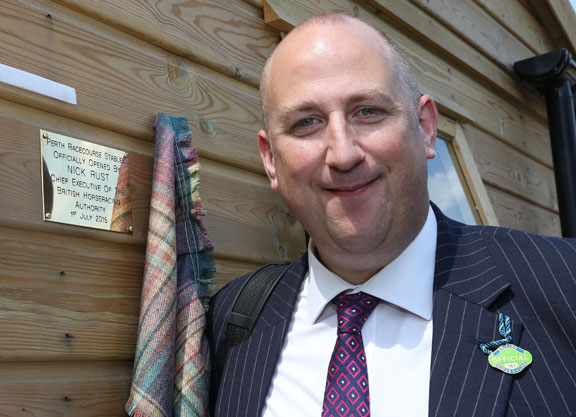By Emma Berry
The British racing industry will wait with bated breath to hear the outcome of today's parliamentary questions session in which the government looks set to announce the introduction of legislation to enable a replacement scheme for the levy.
Significantly, the new system, which could be in place by next spring, is likely to incorporate bets on all racing, whether placed in betting shops or online via firms based offshore.
Robin Mounsey, Media Manager for the British Horseracing Authority (BHA), commented, “We are aware that a Parliamentary Question has been lodged for discussion on Thursday morning regarding what progress has been made on replacing the current horserace betting levy. We await the Government's response with interest.”
News of a potential announcement came shortly after BHA Chief Executive Nick Rust had addressed an audience of industry participants at Tattersalls in Newmarket during the annual 'roadshow'. The BHA Industry Update, which included presentations from Great British Racing Chief Executive Rod Street, as well as the BHA's Director of Raceday Operations and Regulation Jamie Stier and new Chief Operating Officer Richard Wayman, was first staged last April during Rust's first few months in office and takes place in three different venues across the UK.
Alluding to the forthcoming announcement, which the BHA hopes will help to boost the sport's finances by millions of pounds currently lost through offshore betting, Rust said, “We have made good progress with government on a Racing Right. There's been a lot of help from people in this room who have tirelessly lobbied at the highest level and with local MPs and other parliamentarians to make sure that the plight of our sport and our industry is understood, as well as the urgency with which we need to see the loophole closed. I expect to see some news from government soon.”
In a bid to halt the loss of an estimated £30 million to the sport's finances, the BHA recently launched the Authorised Betting Partners (ABPs) scheme, which came into operation on Jan. 1 and rewards those betting firms which make a contribution to the levy from the digital side of their business. Racecourses which have signed up to the scheme–including all those operated by Arena Racing Company and Jockey Club Racecourses–will no longer accept sponsorship from bookmakers which are not ABPs.
“We launched ABPs in an effort to ensure a fair and reasonable payment from remote betting operators for betting on British racing,” said Rust. “There has been some disquiet but broadly speaking British racing has stayed together on it and I'm very pleased about that. Progress has been made through having a common purpose.”
While racing's funding remains a priority, Rust also outlined other key areas in which his team is working to improve the sport's profile.
He said, “We are particularly focused, and I think this is key for this year, on equine welfare matters. It's important that our sport continues to take practical steps to look after the current and future crops of our equine heroes in a world which increasingly scrutinises our sport's performance and duty of care in this area. British racing is recognised around the world as having a high standard in equine care but there can be no room for complacency, so we are implementing a five-year plan which will be overseen by our Chief Veterinary Officer Jenny Hall.”
With the results of a recent Integrity Review to be announced later this month after the Cheltenham Festival, the BHA Chief Executive outlined progress in other areas since he last addressed industry members in public. Encouraging factors include a 5% rise in betting participation and 300 more horses in training–the latter being a step towards the hoped-for 1,000 extra horses in training by 2020, as suggested during the 2015 update.
He acknowledged, however, that there are still areas for concern. “Yes, there have been prize-money increases but very much at the top end of the sport and we have to keep focusing on the overall health of our sport across the 362-day-per-year product which we provide,” said Rust.
“The number of sole owners is continuing to fall in that middle-income group that we have relied upon for years but syndicates are growing. Levy income is continuing to decline and many people are struggling with financial viability within our industry. We believe that more than 50% of licensed trainers are not contributing to their own income from their participation in the sport.”
The theme of racing presenting a united front was revisited several times by Rust throughout his presentation and it seems, finally, that these are not just hollow words.
He said, “We have made some progress but there's a heck of a lot to do. My message really is that there are causes for optimism if we can keep working together and keep understanding different parts of the industry and making a difference, on funding in particular, to help move our sport forward. No-one is sitting here saying everything in the garden is rosy–far from it. We are committed to work with our colleagues around the members' committee table to drive this sport forward.”
Not a subscriber? Click here to sign up for the daily PDF or alerts.






